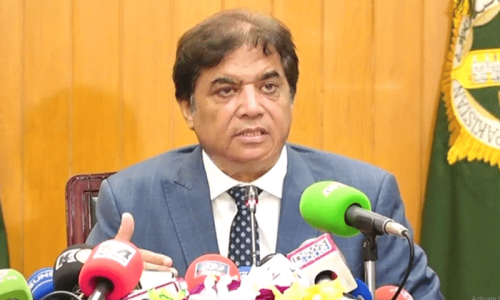IN the run-up to the Feb 8 polls, extensive promises were made to the public by political parties in their election manifestos and speeches. However, post-election, many individuals seem to be suffering from selective amnesia, with some backtracking from their strong stance against other parties, and others conveniently forgetting their resentment against the establishment.
Amid this air of forgetfulness, it is crucial to remind political representatives of the promises they made in their poll campaigns. Holding parties accountable for their performance is crucial to steer Pakistan towards stability and progress, and to ensure that the trust of the people is upheld, democratic principles respected, and the nation’s long-term interests safeguarded.
Given our economic and social challenges, collective commitment from all political stakeholders is urgently required for transformative reforms. Since the new government is a minority dispensation, there is a real opportunity for parties to jointly develop a charter of economy, comprising at the minimum what the PML-N and PPP individually promised in their manifestos.
A comparison of their election manifestos reveals significant areas of common ground, providing a foundation for further discussion between the two parties as well as others representing political rivals. For instance, both indicate the need to create better employment and entrepreneurship opportunities, introducing a labour policy to protect the rights of informal workers, and to promote decent work. Both also mention enhancing the focus on the IT, tourism, and smart agriculture sectors. To manage the current account deficit, their aim is to boost exports, curtail imports, and lower tariffs on raw material imports, thereby fostering growth in the manufacturing sector.
A collective commitment from all politicians is needed.
In terms of infrastructure development, the parties recognise the need for investment in transportation, with particular focus on rural development, to address regional inequalities. They understand the need to leverage CPEC’s full potential for regional development. Energy sector reforms have also been promised, aimed at enhancing efficiency, promoting conservation, and increasing reliance on alternative and renewable sources of energy.
To address fiscal challenges and ensure sustainable domestic resource mobilisation, they have promised the implementation of SOE and tax reforms. Civil service reforms that emphasise meritocracy, accountability, and capacity development have also been outlined. Most importantly, both the PPP and PML-N have stressed the need to fully devolve powers to the provincial and local levels, thereby empowering local governments.
Moreover, both have pledged to provide universal healthcare and education, and to enhance the social security net through the expansion of the BISP and Ehsaas programmes. They have highlighted the need for inclusivity by promoting equal rights for marginalised segments, in particular women. Fulfilling this promise is essential to show strong resolve for good governance. Merit and experience must supersede family ties, particularly in the appointment of prominent cabinet positions.
It is important to note that these promises are not new: these political parties have been making the same promises in every election cycle, as evident from a review of their manifestos. However, their actions or apathy have frequently negated these promises.
For instance, these flag-bearers of dynastic politics persist in appointing individuals to top party and government positions based on lineage and family links, contradicting their stated commitment to inclusion and equal opportunities. Even women who are brought to the forefront to make a case for gender equality often appear to have defied merit and experience to assume their positions. Such actions not only undermine inclusivity, but also governance as a whole.
Despite repeated commitments to enact tax and SOE reforms, neither party has taken significant steps towards implementation. Even basic measures, such as integration of e-governance and the full adoption of the Single Treasury Account to improve accountability, have yet to materialise.
Most importantly, not only do the promises to establish fiscal sustainability in Pakistan remain unfulfilled, but the crisis was exacerbated through the implementation of unsustainable populist measures, such as a fixed exchange rate, inadequate tariffs, delays in going to the IMF, and so on.
Having formed a coalition government against a wider public mandate, there is no excuse for the PML-N and PPP to not deliver on their common promises this time around. Pakistan cannot take any more disappointments.
The writer is a senior research associate at the Sustainable Development Policy Institute, Islamabad. The views are the writer’s own and do not reflect the SDPI’s position.
X: @AroojWDar
Published in Dawn, March 5th, 2024










































